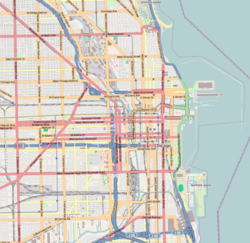Chicago Sinai Congregation
| Chicago Sinai Congregation | |
|---|---|
| Religion | |
| Affiliation | Reform Judaism |
| Ecclesiastical or organisational status | Synagogue |
| Leadership |
|
| Status | Active |
| Notable artwork | Brian Clarke stained-glass windows |
| Location | |
| Location | 15 West Delaware Place, Chicago, Illinois 60610 |
| Country | United States |
| Geographic coordinates | 41°53′56″N 87°37′43″W / 41.8989°N 87.6287°W |
| Architecture | |
| Architect(s) | Dirk Lohan |
| Type | Synagogue |
| Date established | 1861 (as a congregation) |
| Completed | 1996 |
| Website | |
| chicagosinai | |
Chicago Sinai Congregation[a] is a Reform Jewish congregation and synagogue located at 15 West Delaware Place, in Chicago, Illinois, in the United States. Founded in 1861, the current synagogue building was designed by Dirk Lohan and completed in 1996, inclusive of stained-glass windows by British artist Brian Clarke.
History
[edit]Founded in 1861, Chicago Sinai Congregation was the first Reform congregation to be established in Chicago.[1] During the nineteenth century, the congregation helped pioneer and promote the controversial ritual reform of the Sunday Sabbath (substituting Saturday for Sunday) for Jewish communities in America.[2][3]
In the late nineteenth century, the congregation became the site of speculation concerning the possibility of a woman rabbi in the United States. In 1897, Hannah G. Solomon of Chicago was touted in the press as America's first woman rabbi following her preaching at the congregation.[4][5] Solomon later reported that the invitation to speak was offered by Rabbi Emil Hirsch and that Hirsch's practice to allow Jewish women to speak from the pulpit was later adopted by other congregations.[6]
Rabbis
[edit]The early rabbis to have served in the congregation include Bernhard Felsenthal (served from inception in 1861-1864), Isaac Leow Chronik (served from 1866-1871),[2] Kaufmann Kohler (served from 1871 to 1880),[3] Emil G. Hirsch (served from 1880-1923).[7][8] Rabbis in the twentieth century include Richard C. Hertz (served from 1947-1953),[9] and Philip N. Kranz (served from 1971-1980).[10]
Gallery
[edit]See also
[edit]Notes
[edit]- ^ Also referred to as Temple Sinai or Sinai Temple.
References
[edit]- ^ "First Reform synagogue Chicago". Chicago Sinai.[self-published source?]
- ^ a b Olitzky, K. (1985). "Sundays at Chicago Sinai Congregation: Paradigm for a Movement". American Jewish History. 74 (4): 356–368.
- ^ a b Olitzky, K. (1982). "The Sunday-Sabbath Movement in American Reform Judaism: Strategy or Evolution?". American Jewish Archives. 34 (1): 75–88.
- ^ "The First Woman Rabbi". The Burlington Free Press. Burlington, Vermont. March 16, 1897.
- ^ "The First Woman Rabbi". Brandon Mail. Manitoba, Canada. March 18, 1897.
- ^ Solomon, H. G. (1946). Fabric of My Life: The Autobiography of Hannah G. Solomon. New York: Bloch Publishing Company. pp. 111–112.
- ^ Adler, C.; Vizetelly, F. H. (1906). "Hirsch, Emil Gustav". Jewish Encyclopedia. Vol. 6. pp. 410–411.
- ^ Heilbrunn, B. A. (2012). Faith as motive for reform: Emil G. Hirsch and Chicago Jewish Progressives. University of Houston.
- ^ "A Finding Aid to the Richard C. Hertz Papers Manuscript Collection No. 675". American Jewish Archives.
- ^ "Rabbi Philip N. Kranz Papers". The Berman Museum.
External links
[edit]



